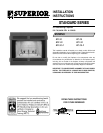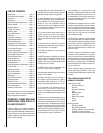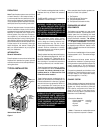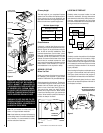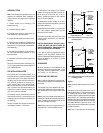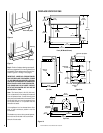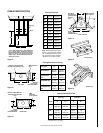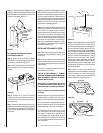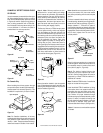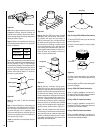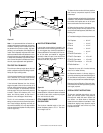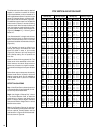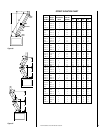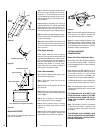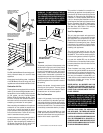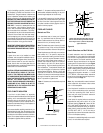
NOTE: DIAGRAMS & ILLUSTRATIONS NOT TO SCALE.
8
Step 4. Fireplace should be fastened to side
framing members using the nailing tabs at the
top and bottom of the fireplace front face. Use
8d nails or equivalent (
Figure 17
).
Step 3. Position appropriate firestop spacer at
ceiling and nail temporarily with two (2) 8d
nails. Use flat firestop spacer, Model F8FS-2, if
chimney penetrates ceiling vertically. If chim-
ney penetrates ceiling at 30° angle (offset chim-
ney), use 30° firestop spacer, Model F8FS30.
Use one nail on opposite sides to hold firestop
spacer in position. Nail permanently, using at
least two (2) more 8d nails, after chimney
sections have been assembled through the
firestop spacer and after any necessary adjust-
ments have been made. Firestop spacer must
be secured by at least four (4) 8d nails when
completely installed.
Note: If there is a room above ceiling level,
firestop spacer must be installed on the bottom
side of the ceiling. If an attic is above ceiling
level, firestop spacer must be installed on top
side of ceiling joist (Figures 20 and 21 ).
Figure 20
Figure 21
Figure 17
For Canadian Installations Proceed
with Steps 5 through 8
Step 5. Attach the cold climate kit, Model
FTF8-CCK1-LD, around the chimney collar with
the screws provided (
see Figure 18
).
Note: CCK1-LD model requires a 6" diameter
Class 0 metallic air duct, acquired locally by
installer.
Figure 19
Firestop Spacer
Room Above
Firestop Spacer
Attic Above
Figure 18
Step 6. Connect the 6" (152 mm) Class 0
metallic air duct to the collar on the chimney
collar enclosure with the screws provided in
the hardware kit.
Step 7. Route the Class 0 metallic air duct out
the back wall or side wall, up through the ceiling
or floor joists to an outside wall. The air duct’s
inlet should be located above any anticipated
snow level.
Note: If the fireplace is installed against an inside
wall, the Class 0 metallic air duct may be ex-
tended into a ventilated attic space at least 18"
(457 mm) above the attic floor. Secure the duct
hood to a vertical post with the inlet positioned
downward. Ensure that nothing blocks the hood
opening. This air duct must never terminate
higher than the fireplace chimney.
Step 8. Cut or frame a hole through the outside
wall for the installation of the duct inlet hood. A
6-1/2" (165 mm) diameter hole is required.
Feed the loose end of the flexible duct through
the hole cut for the inlet hood and attach to the
collar on inlet hood using two (2) screws. Insert
the hood into the opening. Secure in place with
nails driven through the holes in hood flange.
Seal with noncombustible waterproof silicon
type caulking. If additional air duct is needed,
use Class 0 metallic duct.
INSTALLING THE CHIMNEY SYSTEM
Step 1. Before continuing, check the operation
of the damper, as described on page 4, (
refer
to Figure 3
).
Step 2. Using standard construction framing
techniques, construct opening for chimney route
up through the ceiling(s) and roof or through an
outside chase.
Framing must maintain adequate minimum air
space clearance at all times.
CAUTION: ALLOW MINIMUM 1"* CHIMNEY
AIR SPACE TO COMBUSTIBLE FRAMING MEM-
BERS THROUGHOUT VERTICAL OR OFFSET
CHIMNEY INSTALLATION.
A minimum 1"* air space must be reserved for
all combustible materials extending for any
continuous length surrounding the chimney.
*Note: 2" clearance to combustibles required
in Canada.
Reference
Figures 15 and 16
and charts Fram-
ing Dimensions for Ceiling and Roof, which
specify minimum ceiling and roof dimensions.
In new construction, to determine chimney cen-
ter line, use plumb line from roof or ceiling above
fireplace to center of flue collar on fireplace.
For remodeling, plumb to center of flue collar
from ceiling above, drive nail through ceiling
from below to mark position, then mark and
cut to passage from above ceiling (around
nail) (
see Figure 19
). Then plumb from ceiling
or roof level directly above hole which has just
been completed.
8d Nail Or
Equivalent
Fastener



